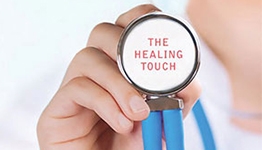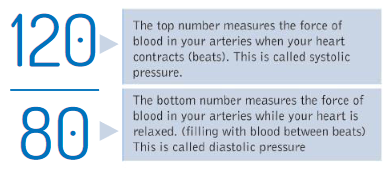Health Record


Always keep track of your blood pressure, blood glucose and cholesterol at regular intervals.
Blood pressure
- Blood pressure is the force of blood moving through your arteries pumped by your heart to the body.
- Blood pressure is measured with two numbers Systolic & Diastolic. As shown in the igure below.

- Blood pressure lower than or equal to 120/80 is ideal.
- For people with diabetes or kidney disease, blood pressure lower than 130/80 is good. Lower than 120/80 is ideal.
- Blood pressure between 120–139/80–89 is considered “pre-hypertension” and requires lifestyle changes to reduce the risk of stroke.
- A blood pressure reading equal to or higher than 140 over 90 is high.
Blood pressure
Systolic blood pressure : .............................. mm Hg
Diastolic blood pressure : .............................. mm Hg
Diabetes
- Diabetes is a condition in which the level of glucose (sugar) in the blood is too high, which makes it dificult for the body to use for energy.
- Our bodies need some glucose in the blood for energy at a range of 120mg/dl. Anything higher is bad for the health.
- Your risk of diabetes is high if you have high blood pressure, low HDL (good cholesterol) or high triglycerides, or if you are overweight, obese or a smoker.
- Diet and exercise plays a key role in managing diabetes. Maintaining an ideal body weight is very important. Excess weight always causes poor control of blood sugar.
Blood Glucose
Random blood glucose : .............................. Mg/dl
Fasting blood glucose : .............................. Mg/dl
Cholesterol
- Cholesterol is a waxy, fat-like substance that’s found in the blood stream and all cells of the body.
- Your body needs some cholesterol to make hormones, vitamin D, and substances that help you digest foods.
- LDL cholesterol is “bad” cholesterol. A high LDL level leads to a build up of cholesterol in your arteries.
- HDL cholesterol is “good” cholesterol. This is because it carries cholesterol from other parts of your body back to your liver. Your liver removes the cholesterol from your body.
- The higher the level of LDL cholesterol in your blood, the GREATER your chance is of getting heart disease.
Total cholesterol
Total cholesterol : .............................. Mg/dl
Body Mass Index (BMI)
- Body Mass Index (BMI) is a person’s weight in kilograms divided by the square of height in meters.
- BMI can be used to screen for weight categories that may lead to health problems but it is not diagnostic of the body fatness or health of an individual.
- A BMI below 18.5 is considered underweight, BMI ranging from 18.5 to 24.9 is considered healthy, while 25 to 29.9 is considered overweight and BMI above 30 is considered obese.
- Diet and exercise plays a key role in maintaining an ideal body weight.
BMI Chart
| BMI Less than 18.50 | Underweight |
| BMI 18.50 - 24.99 | Healthy weight |
| BMI 25.00 - 29.99 | Over weight |
| BMI 30 or more | Obese |
Body Mass Index
Weight: ................ kg
Height: ................ cm
Body Mass Index : ....................................................
Disclaimer: The information in the lealet is provided as a reference only, For further advice and guidance please consult your doctor.



